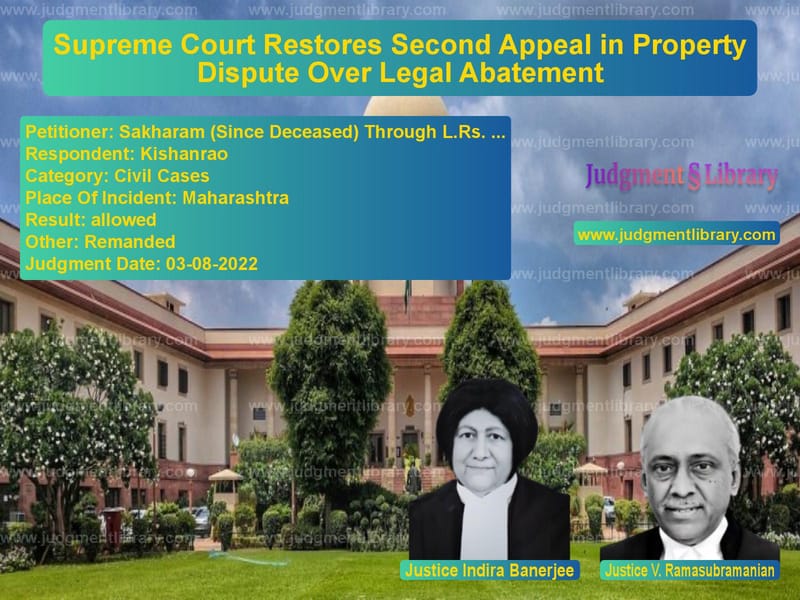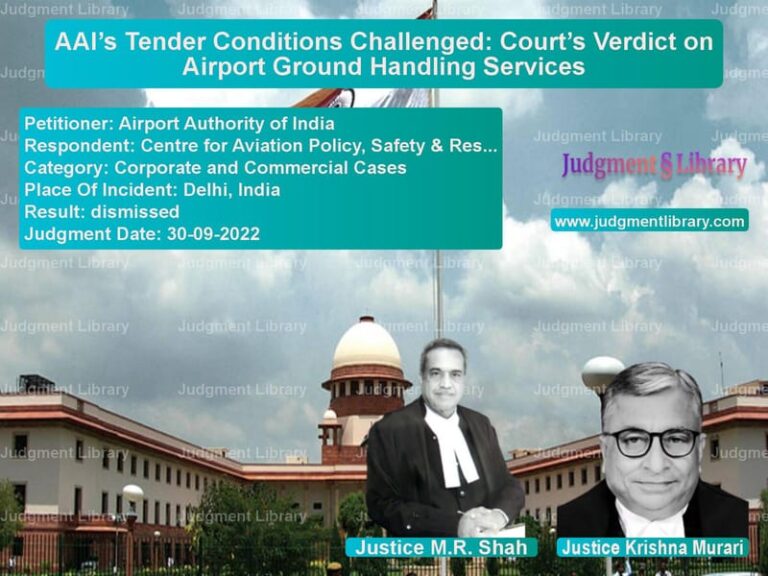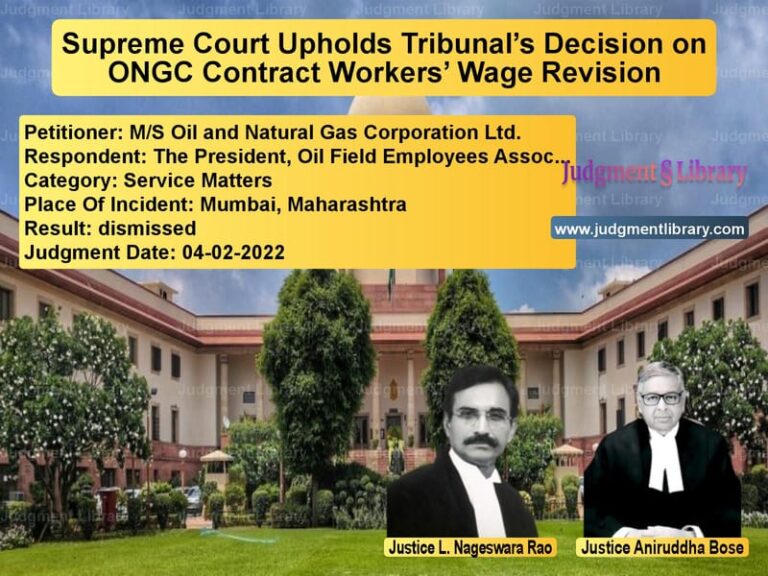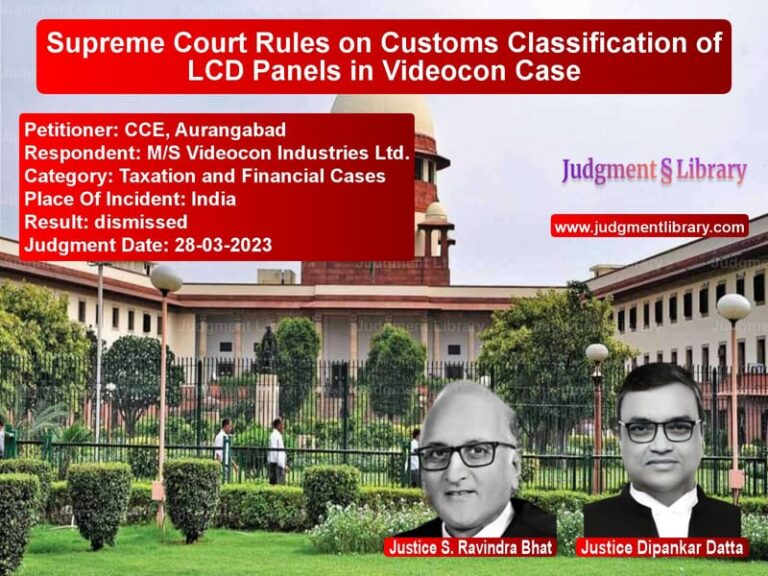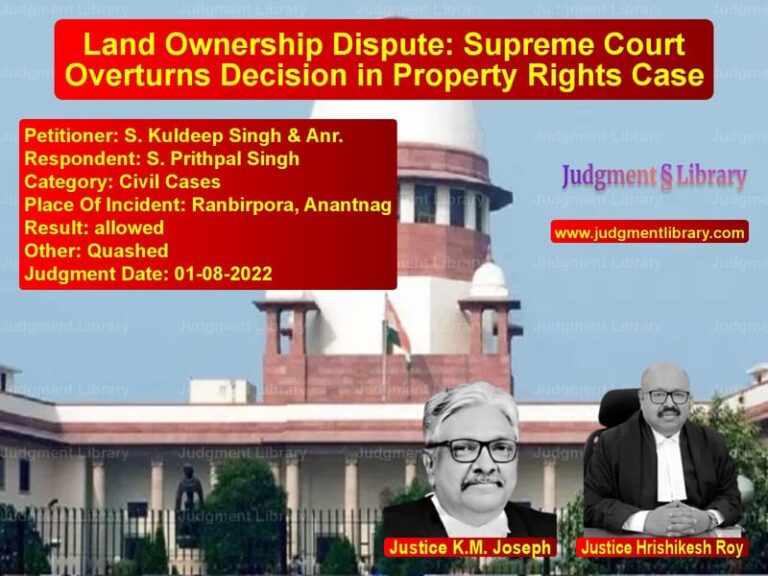Supreme Court Restores Second Appeal in Property Dispute Over Legal Abatement
The Supreme Court of India, in Sakharam (Since Deceased) Through L.Rs. & Anr. v. Kishanrao, dealt with a crucial legal issue regarding the abatement of an appeal upon the death of a party. The case centered around a long-standing property dispute where the Bombay High Court had dismissed a second appeal, holding that it had abated due to the non-substitution of a deceased respondent’s legal representatives.
Background of the Case
The case arose from a property dispute between the two sons of one Tukaram Rodge (plaintiffs) and the two sons of Gangaram Rodge (defendants). The plaintiffs had filed a suit for declaration and possession, which was dismissed by the trial court. However, in an appeal, the First Appellate Court decreed the suit in favor of the plaintiffs. Aggrieved by this decision, the defendants filed a second appeal before the Bombay High Court.
During the pendency of the second appeal:
- The plaintiffs’ mother (a proforma respondent) died in 1994, but since her legal heirs were already on record, no substitution was necessary.
- One of the plaintiffs, who was also a respondent in the second appeal, passed away in 1996.
- The High Court held that the failure to bring on record the deceased respondent’s legal representatives resulted in the abatement of the second appeal.
Following this decision, the appellants (defendants) approached the Supreme Court, challenging the High Court’s order dismissing their appeal as abated.
Petitioners’ (Appellants’) Arguments
The appellants argued:
- The High Court erred in holding that the second appeal had abated.
- Since there were multiple plaintiffs, the right to sue survived upon the remaining respondent.
- Order XXII Rule 2 of the Civil Procedure Code (CPC) states that when the right to sue survives against the remaining plaintiffs or defendants, the suit should continue.
- The legal representatives of the deceased plaintiff were already parties to the appeal, rendering any substitution unnecessary.
- The High Court dismissed their application for setting aside abatement without proper consideration.
Respondent’s Arguments
The respondent, Kishanrao, countered these arguments by stating:
- The appellants failed to comply with procedural requirements in time.
- Bringing the legal heirs of the deceased respondent on record was necessary to prevent the abatement of the appeal.
- The High Court had rightly concluded that the second appeal abated due to procedural lapses.
Supreme Court’s Key Observations
The Supreme Court, after analyzing the arguments and applicable legal provisions, made the following key observations:
- Under Order XXII Rule 2 CPC, when there are multiple plaintiffs or defendants, and one dies, the right to sue continues with the surviving parties if the cause of action remains unaffected.
- The High Court’s interpretation that the second appeal had abated was legally incorrect.
- The failure to bring on record the legal representatives of the deceased plaintiff did not impact the continuation of the second appeal, as the surviving plaintiff/respondent still had the right to contest.
- The High Court erred in dismissing the application to set aside abatement without considering the principles of Order XXII CPC.
Supreme Court’s Judgment
The Supreme Court allowed the appeal, setting aside the High Court’s orders. The key directions were:
- The second appeal was restored for fresh consideration on merits.
- The High Court was directed to expedite the hearing and dispose of the appeal within six months.
- The dismissal of the application to set aside abatement was reversed.
Impact of the Judgment
This ruling holds significant implications for civil litigation:
- Clarification on Legal Abatement: The judgment reinforces that when multiple plaintiffs or defendants exist, the survival of the right to sue ensures that the case does not abate due to the death of one party.
- Preventing Procedural Miscarriage: The decision ensures that cases are not dismissed due to procedural lapses that do not affect the core dispute.
- Strengthening Fair Trial Rights: By restoring the second appeal, the Supreme Court emphasized the need for courts to prioritize substantive justice over technical dismissals.
Conclusion
The Supreme Court’s judgment in Sakharam (Since Deceased) Through L.Rs. & Anr. v. Kishanrao provides essential clarity on the legal doctrine of abatement in civil litigation. By emphasizing the principles of Order XXII CPC, the ruling ensures that procedural errors do not override substantive justice. The decision serves as a vital precedent in ensuring that appeals are adjudicated on their merits rather than dismissed on technical grounds.
The High Court will now hear the appeal afresh, providing the appellants an opportunity to contest the matter substantively. This case reaffirms that procedural fairness remains a fundamental aspect of India’s judicial system.
Petitioner Name: Sakharam (Since Deceased) Through L.Rs. & Anr..Respondent Name: Kishanrao.Judgment By: Justice Indira Banerjee, Justice V. Ramasubramanian.Place Of Incident: Maharashtra.Judgment Date: 03-08-2022.
Don’t miss out on the full details! Download the complete judgment in PDF format below and gain valuable insights instantly!
Download Judgment: sakharam-(since-dece-vs-kishanrao-supreme-court-of-india-judgment-dated-03-08-2022.pdf
Directly Download Judgment: Directly download this Judgment
See all petitions in Succession and Wills
See all petitions in Contract Disputes
See all petitions in Damages and Compensation
See all petitions in Judgment by Indira Banerjee
See all petitions in Judgment by V. Ramasubramanian
See all petitions in allowed
See all petitions in Remanded
See all petitions in supreme court of India judgments August 2022
See all petitions in 2022 judgments
See all posts in Civil Cases Category
See all allowed petitions in Civil Cases Category
See all Dismissed petitions in Civil Cases Category
See all partially allowed petitions in Civil Cases Category

